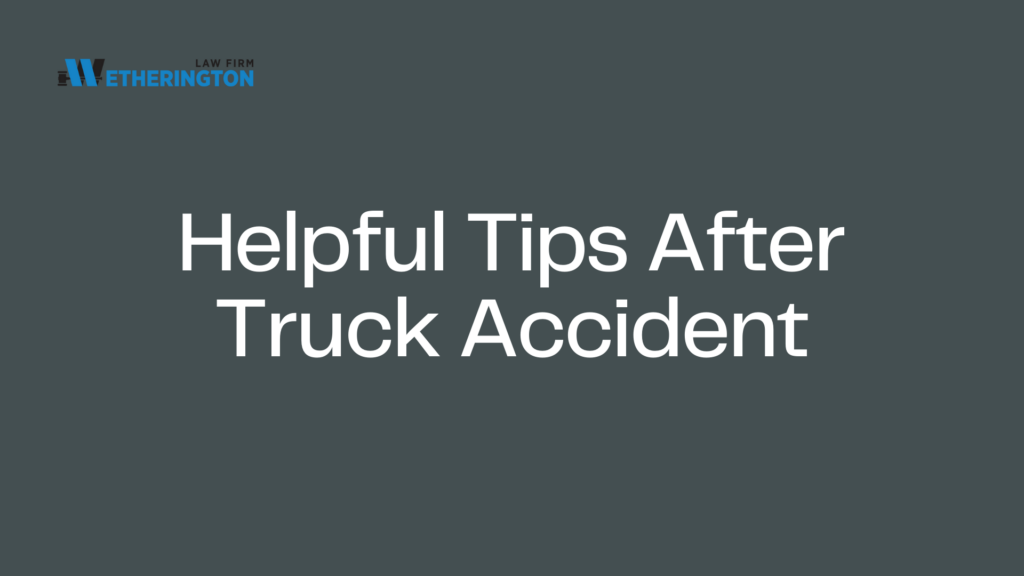How to Claim for Truck Accident Injuries Caused by Blind Spots
Posted by Wetherington Law Firm | Articles, Truck Accidents
- Articles
- Artificial Intelligence
- Car Accidents
- Class Action Lawsuit
- Comparative Negligence
- Crime Victim
- Defective Vehicles
- Disability
- Kratom Death and Injury
- Legal Marketing
- Motor Vehicle Accidents
- News/Media
- Other
- Pedestrian Accidents
- Personal Injury
- Results
- Sexual Assault
- Truck Accidents
- Uber
- Wrongful Death
Categories

Key Highlights:
- Step 1: Get Medical Help: Seek immediate care to uncover hidden injuries; it’s vital for claims.
- Step 2: Document Scene: Capture photos of vehicles, conditions, and any signs of fault.
- Step 3: Exchange Info: Share details with the truck driver; gather witness contacts.
- Step 4: File Police Report: Provide a full account for official documentation.
- Step 5: Notify Insurance: Report the accident factually to your insurer, aiding their review.
Truck accidents due to blind spots—areas around a vehicle where visibility is limited—can lead to serious injuries. Given the sheer size of trucks, blind spots often cause severe accidents, putting other drivers at risk. When these accidents occur, you may be entitled to compensation for injuries, medical expenses, lost income, and emotional distress. Here’s a step-by-step guide to claiming compensation after a truck accident caused by blind spots.
Step 1: Prioritize Your Health and Seek Medical Attention
After an accident, make your health the top priority. Even if you feel fine, seek medical care to identify any hidden injuries like concussions, whiplash, or internal bleeding. A thorough medical examination helps establish a record of your injuries, which is crucial when seeking compensation for handling medical bills and making other claims. The documentation provided by your doctor connects your injuries to the accident, supporting your claim for compensation.
Step 2: Document the Accident Scene Carefully
Use your phone to capture the accident scene in detail. Photos and videos should include all vehicles involved, road conditions, weather, and traffic signals. If the truck’s blind spots played a role, this documentation can strengthen your argument for accident liability.
Step 3: Exchange Contact Information and Collect Witness Statements
Gather contact information from the truck driver and any other involved parties. If witnesses are present, ask for their contact details and, if possible, brief statements. Witnesses can provide valuable evidence, especially if they saw unsafe behavior from the truck driver, such as failing to check mirrors or making abrupt lane changes. These accounts can be vital for proving driver negligence and reinforcing your case.
Step 4: File a Police Report
When the police arrive, give them a complete account of what happened. The police report will serve as official documentation for your claim, including details on the accident and preliminary fault assessments. Request a copy, as it can play a significant role in getting a police report for insurance and legal proceedings. This report is often one of the most trusted resources for insurers and attorneys to verify accident details.
Step 5: Notify Your Insurance Provider
Contact your insurance company as soon as possible to report the accident. Share the factual information you’ve gathered without making assumptions about who’s at fault. Your insurance company will investigate the incident and may coordinate with the trucking company’s insurance provider. Awareness of the accident timeline can help you remain patient, as cases involving commercial vehicles may take additional time due to liability reviews.
How Can a Lawyer Help After a Truck Accident?
An Atlanta personal injury lawyer specializing in truck accidents can significantly improve your case outcome by:
- Gathering Additional Evidence: Lawyers have access to resources, such as truck maintenance records, traffic footage, and the truck driver’s logbook, which can be crucial in establishing fault.
- Determining Liability: They can assess if the truck driver or company failed to follow blind spot protocols, helping build a strong case for negligence.
- Navigating Insurance Negotiations: Trucking companies and insurers often have robust legal teams. An experienced lawyer can ensure you receive fair compensation for medical costs, lost wages, and emotional distress.
- Representing You in Court: If settlement negotiations don’t yield fair results, a lawyer can represent your case in court, emphasizing key issues like “duty of care” and “negligence.”
Common Mistakes to Avoid
- Neglecting Medical Attention: Seek medical care immediately after the accident to ensure any hidden injuries are treated and documented.
- Failing to Document the Scene: Comprehensive evidence collection strengthens your case. Make sure to gather photos, witness contacts, and a police report.
- Accepting an Early Settlement: Some insurance companies may offer low settlements early on. Consulting a lawyer can help ensure that any offer covers all your medical expenses and damages.
Talk to a Truck Accident Attorney Today
If you were injured in a truck accident caused by blind spots, speaking with a truck accident lawyer can make a significant difference in your case outcome. Our Atlanta truck accident lawyers can guide you through gathering evidence, negotiating with insurers, and understanding your legal rights. They work to ensure you’re compensated fairly for your injuries, pain, and financial losses.
Contact us for a free consultation or call (404) 888-4444. You won’t have to pay unless we win your case!
Conclusion
Being involved in a truck accident due to blind spots can have lasting effects on your physical health and financial stability. By documenting the accident, collecting witness statements, and consulting a legal expert, you can improve your chances of receiving fair compensation. Remember, you have the right to seek compensation for the physical, emotional, and financial impact of the accident. Don’t hesitate to consult a lawyer if you encounter challenges or need guidance throughout the process.
All our cases are handled on a contingency basis so you do not have to pay us until we win. Contact us today for a free case evaluation.